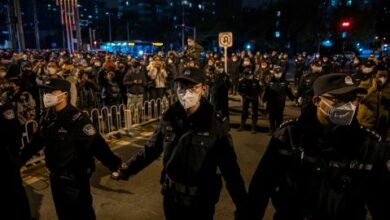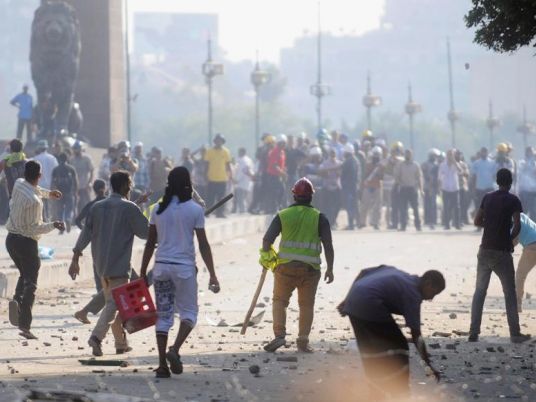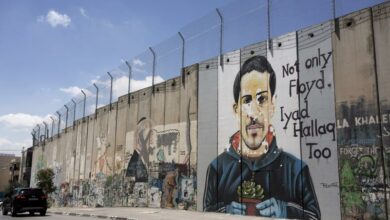Police quickly quelled a scheduled peaceful demonstration in Cairo today with an array of security measures, including violent interventions and on-the-spot arrests. Planned protests in Alexandria and other cities throughout Egypt were also broken up by security personnel.
According to human rights watchdogs, up to 93 activists were detained as they headed towards downtown Cairo to partake in a protest in front of the Shura Council (the upper, consultative chamber of parliament). Some were reportedly beaten.
Activists were from the 6 April Youth Movement, the leftist Tagammu Party, the liberal Ghad Party and the National Association for Change (NAC)–Mohamed ElBaradei’s pro-reform coalition–and from other groups.
Protesters had planned to walk from downtown Cairo’s Tahrir Square to the nearby People’s Assembly in an attempt to emulate the 6 April, 2008 general strike and protest Egypt’s longstanding Emergency Law. They were intercepted, however, by security forces determined to curb the scheduled demonstrations.
In 2008, workers from the state-run Ghazl el-Mahalla textile factory in the Nile Delta city of Mahalla attempted to call a labor strike to protest low wages and rising food prices. In a parallel action, cadres of young Egyptians employed social-networking website Facebook to call for a general strike in solidarity with the Mahalla workers and to also protest runaway inflation.
Although the strike at the textile mill was aborted after police occupied the factory, the delta town erupted in a two-day uprising that was met with rubber bullets and live ammunition. The ensuing melee left three citizens dead and hundreds in police custody.
Police violence has been no less conspicuous this time around.
“I was walking with my fiancé to Tahrir Square to take part in the protest,” a visibly shaken Heba Qura’, engineer and NAC member, told Al-Masry Al-Youm. “The police arrested him and beat him up. When I was trying to pull him to my side, I was kicked by female police,” she recounted, showing the resultant bruises.
Qura’ was one of several young people whose gathering in front of the People’s Assembly was violently broken up, with police beating up protesters and detaining many in trucks.
In downtown Cairo’s Talaat Harb square, anti-riot forces and police trucks surrounded the premises of the Ghad Party, whose leader, Ayman Nour, was reportedly banned from taking to the street. Nour, along with bullhorn-wielding supporters, chanted from the building’s terrrace: “Mubarak, Egypt is not your dad’s property."
Meanwhile, some 70 protesters converged at the Egyptian Lawyers’ Syndicate with signs reading, “We’re being strangled.” “Open the prison doors, for tomorrow the revolution will rise,” they shouted. They were also cordoned off by dozens of riot police who eventually broke up the protest.
In Tahrir Square, Al-Masry Al-Youm witessed security officers herding activists into trucks. “Three trucks carrying activists headed to the Cairo-Ismailia Road and took many of them to the Roads and Ports Safety Directorate,” Ahmad Ragheb, head of the Hisham Mubarak Law Center (HMLC), told Al-Masry Al-Youm.
Ragheb was also working with the Committee to Protect Egypt’s Protesters, a coalition of human rights lawyers who monitor police violations and offer legal assistance to detainees. Arrested activists managed to text lawyers via their mobile phones as they were being transferred to the directorate’s premises. Both male and female protesters were arrested and beaten, according to Ragheb.
As of press time, detainees were expected to be transferred to the Public Prosecutor’s office in Downtown Cairo ahead of official investigations.
“We are hearing reports of journalists having their cameras confiscated and broken,” Gamal Eid, head of the Arab Network for Human Rights Information (ANHRI), said. In Talaat Harb Square, police officers asked Al-Masry Al-Youm to leave the scene immediately and refrain from taking photographs.
Security was also deployed around the premises of the ANHRI and the HMLC.
ANHRI issued a press release on 4 April reporting that the Cairo Security Directorate had refused a request by activists to stage peaceful demonstrations.
“Given the current security circumstances, such protests can disturb the general security of the capital,” read the directorate’s statement to the ANHRI. "Therefore, we warn those concerned that we do not accept their planned march for security reasons, and they must bear the responsibility of acting accordingly."




